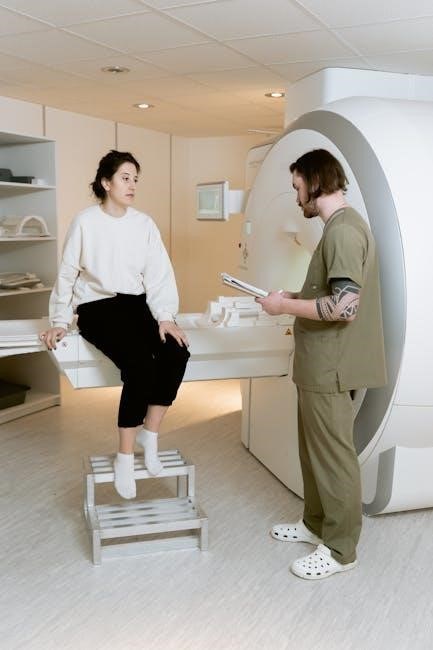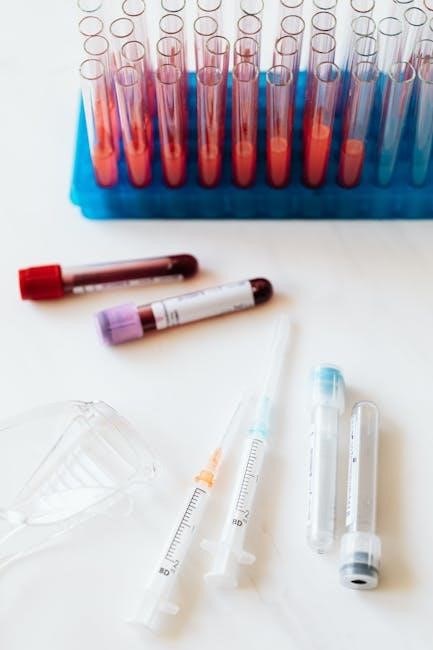Medication aide practice tests are essential tools for exam preparation, offering free PDF resources to help candidates familiarize themselves with the exam format and improve their readiness․
What is a Medication Aide?
A Certified Medication Aide (CMA) is a healthcare professional responsible for assisting nurses and other medical staff in administering medications to patients, primarily in long-term care facilities; Their duties include monitoring patients, ensuring proper dosage, and reporting adverse reactions․ CMAs play a vital role in patient care, ensuring safe and accurate medication administration․ This certification is essential for those seeking to contribute to healthcare teams and enhance patient well-being through precise medication management․
Why Practice Tests are Essential for Certification
Practice tests are crucial for certification as they simulate real exam conditions, helping candidates assess their knowledge and identify weak areas․ These tests familiarize individuals with the format, timing, and types of questions, boosting confidence․ They also provide insights into scoring systems and retake policies, ensuring preparedness․ Utilizing free PDF resources enhances study efficiency, allowing aspiring CMAs to approach the exam with clarity and assurance, ultimately improving their chances of success․
Exam Format and Structure
The Certified Medication Aide exam consists of 100 multiple-choice questions, requiring a minimum score of 40 out of 50 to pass․ Retakes are allowed once․ Practice tests, including free PDF resources, mimic the exam structure, helping candidates familiarize themselves with the format and content․
Multiple-Choice Questions: Overview and Examples
The Certified Medication Aide exam features 100 multiple-choice questions, testing knowledge on medication administration, pharmacology, and safety protocols․ Examples include questions on dosage calculations, drug interactions, and patient rights․ Each question provides four options, with one correct answer․ Scoring is based on accuracy, and free PDF practice tests offer similar question formats, allowing candidates to familiarize themselves with the exam style and improve their readiness․ These resources help build confidence and identify areas for focused study․
Scoring System: Passing Requirements and Retake Policy
The Certified Medication Aide exam requires a minimum score of 40 out of 50 to pass․ Candidates who fail may retake the exam once․ Free PDF practice tests simulate this scoring system, helping candidates understand the passing threshold and retake eligibility․ These resources also provide detailed score reports, enabling focused study on weaker areas to improve readiness for the official exam and ensure compliance with certification standards․

Key Topics Covered in the Medication Aide Exam
The exam covers medication administration techniques, pharmacology basics, dosage calculations, and patient rights, ensuring safe and accurate drug delivery in healthcare settings․
Medication Administration Techniques
Medication administration techniques are critical skills assessed in the exam, focusing on accurate and safe drug delivery․ Key areas include proper routes of administration (oral, IV, IM), handling of special dosages, and adherence to the Six Rights of medication administration․ Understanding how to use equipment like syringes and medication carts is also essential․ Safety protocols, such as barcode scanning and double-checking orders, are emphasized to prevent errors․ Dosage forms and timing are covered, ensuring medications are given correctly and legally, with respect to patient confidentiality and healthcare policies․
Pharmacology Basics and Drug-Specific Questions
Pharmacology basics and drug-specific questions test your understanding of medication classes, side effects, and interactions․ Key areas include recognizing drug names, uses, and contraindications․ Practice tests cover dosage forms and routes, ensuring safe administration․ Drug classifications, such as anticoagulants or antibiotics, are emphasized, along with common side effects and monitoring parameters․ These questions help you apply pharmacology knowledge to real-world scenarios, ensuring accurate and safe medication administration in clinical settings․
Dosage Calculations and Safety Protocols
Dosage calculations and safety protocols are critical for accurate medication administration․ Practice tests cover methods like ratio and proportion, formula-based calculations, and unit conversions․ Safety protocols emphasize the “6 rights” of medication administration: right patient, drug, dose, route, time, and documentation․ Strategies to prevent errors, such as double-checking orders and using barcode scanning, are also highlighted․ These questions ensure you can apply mathematical skills and safety measures in real-world scenarios, promoting patient safety and minimizing risks․
Patient Rights and Confidentiality
Patient rights and confidentiality are fundamental in healthcare․ Medication aides must respect patient autonomy, informed consent, and privacy․ Confidentiality involves safeguarding patient information under laws like HIPAA․ Practice tests cover scenarios requiring adherence to ethical standards, ensuring patients’ rights are upheld during medication administration․ Understanding these principles is essential for ethical practice and maintaining trust between patients and healthcare providers, forming a cornerstone of professional responsibility in patient care settings․
Study Materials and Resources
Free PDF practice tests, online platforms, and comprehensive study guides are available to aid preparation for the medication aide exam, reinforcing understanding and exam readiness effectively․
Free PDF Practice Tests: Where to Find Them
Free PDF practice tests for medication aide exams are widely available online․ Platforms like Quizlet, Examzify, and Practice Quiz offer downloadable PDFs with multiple-choice questions and detailed explanations․ These resources provide realistic exam simulations, helping candidates build confidence and familiarity with the test format․ Many websites also offer flashcards and study guides in PDF format, making it easy to prepare on-the-go․ Utilizing these free resources ensures a well-rounded study experience and enhances readiness for the certification exam․
Comprehensive Study Guides for Exam Preparation
Comprehensive study guides are invaluable for medication aide exam preparation, offering detailed content and structured formats․ Many guides include flashcards, progress tracking, and realistic exam simulations․ Platforms like Quizlet and Examzify provide downloadable PDFs with over 400 questions, flashcards, and detailed explanations․ These resources cover essential topics such as medication administration, pharmacology, and dosage calculations․ They also offer in-depth insights and focus areas to help candidates identify and improve weak spots, ensuring a thorough understanding of the material and boosting exam confidence․
Online Platforms Offering Practice Quizzes
Online platforms like Quizlet and Examzify provide extensive libraries of practice quizzes tailored for medication aide exam preparation․ These platforms offer interactive questions, flashcards, and progress-tracking tools to enhance learning․ Many feature realistic exam simulations, allowing candidates to familiarize themselves with the test format․ Additionally, platforms often include customizable tests, enabling users to focus on specific areas of weakness․ These resources are accessible anytime, making them ideal for self-paced study and ensuring candidates are well-prepared for the certification exam․
Benefits of Using Practice Tests
Practice tests enhance confidence, familiarize candidates with exam formats, and improve performance by identifying weak areas, ensuring better preparation for the certification exam․
Building Confidence and Familiarity with Exam Format
Engaging with free PDF practice tests helps candidates build confidence by familiarizing them with the exam structure, question types, and time management․ Regular practice reduces anxiety, allowing individuals to approach the actual exam with assurance․ These resources mirror real exam conditions, ensuring a smoother experience․ By repeatedly exposing oneself to the format, candidates can refine their test-taking strategies and improve overall performance, leading to better outcomes on exam day․
Identifying Weak Areas for Improvement
Free PDF practice tests are invaluable for identifying weak areas in medication aide exam preparation․ By reviewing incorrect answers and analyzing detailed explanations, candidates can pinpoint gaps in their knowledge․ Regular practice helps track progress, ensuring focused study on challenging topics like pharmacology or dosage calculations․ This targeted approach enables individuals to allocate their study time more effectively, addressing vulnerabilities and strengthening their overall understanding of key concepts before the actual exam․
Simulating Real Exam Conditions
Free PDF practice tests for medication aides simulate real exam conditions, helping candidates familiarize themselves with the format, timing, and question structure․ These resources often include time limits and question types similar to the actual exam, such as multiple-choice questions․ By replicating exam conditions, practice tests reduce anxiety and improve time management skills․ They also expose candidates to a variety of topics, ensuring a comprehensive understanding of key areas like medication administration and pharmacology․ This realistic experience prepares individuals for the challenges they’ll face on exam day, fostering confidence and readiness;

Preparation Tips for the Medication Aide Exam
Utilize free PDF practice tests to enhance your study routine․ Focus on consistent practice, flashcard memorization, and group study to build confidence and exam readiness effectively․
Consistent Study Habits: Creating a Daily Routine
Establishing a daily study routine is crucial for success․ Allocate specific times each day for reviewing medication administration techniques, pharmacology basics, and dosage calculations․ Use free PDF practice tests to simulate exam conditions, ensuring familiarity with question formats․ Incorporate breaks to maintain focus and avoid burnout․ Consistency helps build long-term retention and confidence, making it easier to approach the exam with a well-prepared mindset․
Utilizing Flashcards for Memorization
Flashcards are a powerful tool for memorizing key concepts, such as medication names, uses, and side effects․ They allow for quick review and active learning, enhancing retention․ Carry flashcards with you to utilize spare moments, reinforcing your understanding of pharmacology and dosage calculations․ This method complements free PDF practice tests, helping you identify and focus on weaker areas․ Regular use of flashcards builds confidence and ensures you’re well-prepared for the exam․
Group Study and Peer Support
Group study fosters collaborative learning, allowing you to share knowledge and gain new insights․ Discussing challenging topics with peers clarifies doubts and reinforces understanding․ Peer support motivates and keeps you accountable, making the study process less overwhelming․ Sharing resources, such as free PDF practice tests, enhances collective preparation․ Group sessions also provide opportunities to teach others, deepening your own knowledge and confidence for the exam․
Importance of Rest and Sleep Before Exam Day
Adequate rest and sleep are crucial for optimal performance on exam day․ A well-rested mind processes information more efficiently, enhancing focus and memory recall․ Lack of sleep can impair cognitive function, leading to decreased concentration and decision-making skills․ Ensuring 7-8 hours of quality sleep helps maintain mental clarity, allowing you to approach practice tests and the actual exam with confidence․ Prioritize rest to maximize your ability to apply learned knowledge effectively during the certification process․
Free Resources for Exam Preparation
- Access 119 free review questions with detailed explanations․
- Utilize Quizlet’s library of practice questions for self-assessment․
- Downloadable PDF study guides are available for offline preparation․
These resources provide comprehensive support for mastering medication aide exam content․
119 Free Review Questions and Explanations
Enhance your preparation with 119 free review questions and detailed explanations, specifically designed for the Medication Aide Certification Examination․ These questions cover key topics such as medication administration, pharmacology, and patient rights, ensuring a comprehensive understanding․ Each question is followed by clear explanations to help you grasp concepts and identify areas for improvement․ This resource is ideal for self-assessment and reinforces learning through practical application, making it an invaluable tool for exam success․
Quizlet’s Library of Medication Aide Practice Questions
Quizlet offers a comprehensive library of Medication Aide practice questions, designed to help candidates prepare effectively․ With flashcards, study modes, and test options, Quizlet allows users to build custom practice tests, track progress, and focus on weak areas․ The platform provides detailed explanations for each question, enhancing understanding and retention․ It’s a flexible and interactive tool that complements traditional study materials, making it easier to master key concepts and feel confident for the exam․
Downloadable PDF Study Guides
Downloadable PDF study guides are valuable resources for Medication Aide exam preparation․ These guides provide comprehensive content, including practice questions, detailed explanations, and essential topics like medication administration and dosage calculations․ Available for free or at a low cost, they offer offline access, making them ideal for studying anywhere․ PDF study guides help users build confidence and familiarity with exam questions, ensuring a well-rounded preparation experience․

Exam Requirements and Eligibility
To be eligible for the Certified Medication Aide exam, candidates must meet specific requirements, including being at least 18 years old and completing an approved training program․ Background checks and state-specific criteria may also apply․
Prerequisites for Taking the Certified Medication Aide Exam
To qualify for the Certified Medication Aide exam, candidates must be at least 18 years old and complete an approved training program․ State-specific requirements, such as background checks, may apply․ Additionally, some states mandate specific training hours or certifications․ Meeting these prerequisites ensures eligibility to sit for the exam, which includes 100 multiple-choice questions․ A passing score of 40 out of 50 is required, with the option to retake the exam once if needed․ Proper preparation, including practice tests, is crucial for success․
Age and Training Program Requirements
Candidates must be at least 18 years old to qualify for the Certified Medication Aide exam․ Completion of an approved training program is also mandatory, ensuring foundational knowledge in medication administration․ These programs cover essential topics like pharmacology, dosage calculations, and patient safety․ State-specific requirements may vary, with some mandating additional training hours or certifications․ Proper training ensures candidates are well-prepared to meet exam standards and safely administer medications in healthcare settings․
Background Checks and State-Specific Requirements
Background checks are often required for Medication Aide certification, ensuring patient safety․ Additional state-specific requirements may include TB tests or drug screenings․ Some states demand specific training hours or certifications․ Candidates must verify their state’s regulations to ensure compliance․ These requirements vary, so it’s crucial to consult local authorities․ Proper documentation and clearance are essential before registering for the exam․ Utilizing free PDF resources can help candidates understand these requirements better and prepare accordingly for their certification journey․
Career Prospects as a Certified Medication Aide
Certified Medication Aides are in high demand, with roles in nursing homes, hospitals, and assisted living facilities․ The position offers stability, competitive salaries, and opportunities for career advancement in healthcare․
Salary Ranges and Job Opportunities
Certified Medication Aides earn between $25,000 to $40,000 annually, with higher salaries in states like California and New York due to increased healthcare demand․ Job opportunities are abundant in nursing homes, hospitals, and assisted living facilities, offering stability and growth in the healthcare sector․ The role is essential for patient care, making it a sought-after position with consistent demand․ Salary ranges vary by experience and location, but certification enhances employability and career advancement prospects in this vital healthcare field․
Role of a CMA in Healthcare Settings
A Certified Medication Aide (CMA) plays a crucial role in healthcare settings, primarily assisting with medication administration in nursing homes and clinics․ Their responsibilities include monitoring patients, ensuring proper dosages, and reporting adverse reactions․ CMAs work closely with nurses, enhancing patient care and safety․ This role is vital in supporting healthcare teams, ensuring accurate and safe medication delivery, and contributing to overall patient well-being in various healthcare environments, making them indispensable in daily operations and patient support systems․
Advantages of Certification in the Healthcare Industry
Certification as a Medication Aide offers numerous advantages, including enhanced job prospects, higher salary potential, and increased credibility in the healthcare field․ It validates your expertise in safely administering medications, making you a valuable asset to healthcare teams․ Certification also opens doors to career advancement and specialized roles․ Additionally, it demonstrates your commitment to patient safety and professional growth, which is highly regarded by employers․ Utilizing free PDF practice tests can significantly aid in achieving this certification and unlocking these benefits․

Testimonials from Successful Candidates
Candidates praise the free PDF practice tests for their realistic questions and clear explanations, enabling confident exam success and achieving certification on the first attempt․
Real-Life Experiences and Success Stories
Many candidates have shared inspiring stories of how free PDF practice tests helped them excel․ One user mentioned that the realistic questions and detailed explanations boosted their confidence, leading to a first-attempt pass․ Another highlighted how the variety of scenarios prepared them for the actual exam format․ These success stories underscore the effectiveness of free PDF resources in equipping aspiring medication aides with the knowledge and skills needed to succeed․ Real-life experiences demonstrate the tangible benefits of these study tools․
How Practice Tests Helped in Passing the Exam
Free PDF practice tests provided candidates with realistic exam simulations, improving their problem-solving skills and time management․ The detailed explanations for each question helped clarify complex topics, while the variety of questions ensured comprehensive understanding․ Many users credited these resources with reducing exam anxiety and enhancing their confidence, ultimately leading to successful outcomes․ The structured format and focus on key areas made these tools invaluable for achieving certification․
Utilizing free PDF practice tests and study resources effectively prepares candidates for the medication aide exam, boosting confidence and ensuring a thorough understanding of essential topics․
Final Tips for Achieving Certification
Consistently review medication aide practice tests to identify weak areas and improve knowledge retention․ Utilize free PDF study guides and online quizzes to simulate exam conditions․ Prioritize understanding over memorization, especially in pharmacology and dosage calculations․ Join study groups for peer support and discuss challenging topics․ Ensure adequate rest before the exam to maintain mental clarity․ By combining these strategies, you’ll approach the certification with confidence and readiness․
Encouragement for Aspiring Medication Aides
Embarking on the journey to become a Certified Medication Aide is a commendable step toward a fulfilling healthcare career․ With dedication and the right resources, such as free PDF practice tests, you can master the skills and knowledge required․ Stay consistent in your studies, leverage online tools, and remind yourself of the positive impact you’ll have on patient care․ Your effort today will pave the way for a rewarding future in healthcare․
